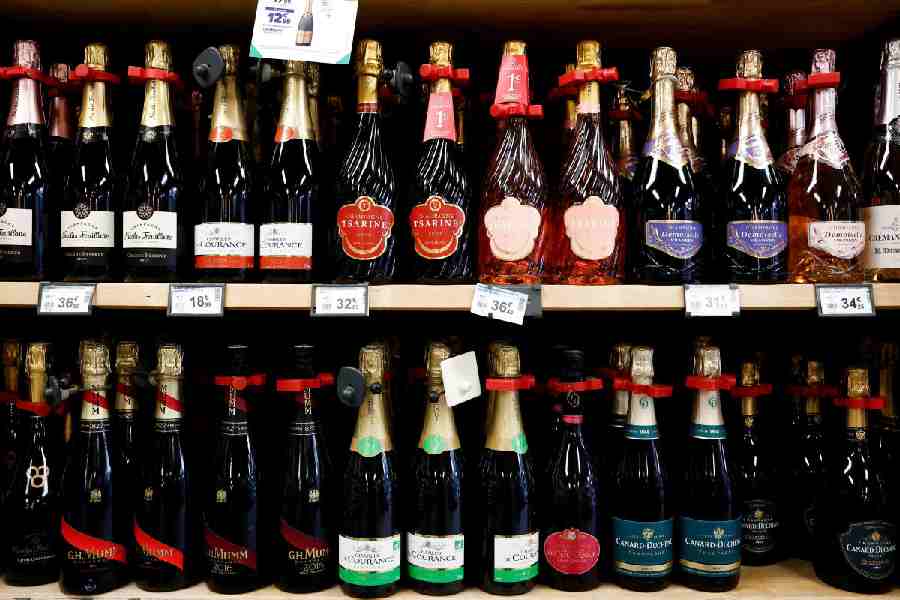 |
| Calcutta gamers at a tournament organised by an electronics mall. Pictures by Sushovan Sircar and Arnab Mondal |
Call of Duty brings a blush of boys down a winding Golf Green alley to Fusion Max, an unremarkable house with a glass door next to a pond in Bijoygarh.
Inside, about 50 boys studiously sit in neat rows with oversized headphones clutching their ears. One hand manoeuvres the mouse, the other dances across a keyboard. Their eyes transfixed on the monitor. None looks up, down, left or right — lest he get arrested, shot or concede a goal.
An atypical gaming café! Right and the chances are there is one (or more) in your neighbourhood as well.
Belur to Bhowanipore and Ballygunge to Behala, gaming cafes have mushroomed like those STD booths of yore — spawning a generation of competitive gamers who have won laurels across the country and abroad.
Unlike Internet parlours, these cafes have only gaming on their menu. And, business has been pretty roaring despite limiting their offer to a single stock because the population of amateur and professional gamers has grown leaps and bounds in Calcutta over the past couple of years.
“Cyber cafes used to put a few games on their computers for the children to play. Times have changed… the demand is now for standalone gaming parlours,” said Purandar Ghosh, who started Fusion Max in 2001.
Some die-hards spend hours behind a console, playing football game “FIFA”. Others sharpen their shooting skills in team games such as Counter Strike and Call of Duty. Defence of the Ancients or DOTA, an online strategy game, has of late caught the fancy of gamers.
Shantanu Basu, 27, who represented India in “FIFA 13” under the e-sports category of the Asian Indoor and Martial Arts Games in South Korea in 2013, had spent about six hours regularly for over three years in a small cafe in Kasba playing the game.
“I did not have a computer or console at home. The cafe charged Rs 10 an hour and allowed me to play without burning a hole in my pocket. I also could compete with other players,” Basu says.
In March, his goal as Dutch star Robin Van Persie in the 2012-13 season of the Fifa-organised Interactive World Cup propelled him to top 6 at the competition that had 2.5 million participants.
The rate — most cafes charge between Rs 10 and 20 an hour — is the top draw. It is kept low because the clientele comprises mostly school and college students who pay from their pocket money.
Cafes also offer membership schemes against a one-time payment. The benefits vary from further slash in rates to free gaming hours.
Gamer’s Paradise, which has an outlet in Bhowanipore and another near Southern Avenue, has over 1,000 registered users. “The membership programme is mutually beneficial… cheaper deal for students and a loyal clientele for us in an increasingly competitive market,” says Gaurav Haralalka, owner of the two cafes.
 |
Owners insist that the crux of a successful parlour is regularly updating and upgrading the computers. At current market rates, a computer with an updated graphics card, motherboard, processor, headphones and monitor sets one back by Rs 50,000.
“Many gaming parlours had to shut shop because of their inability to install new games in their outdated computers,” says Abhijit Kundu, gamer and owner of Cyberia, the 15-computer Patuli cafe off the EM Bypass that draws gaming enthusiasts and addicts from Garia and the Ruby hospital area as well.
He says cafes are thriving primarily because of greater knowledge and acceptance by non-gamers and parents, something that was missing a few years ago.
“I started a cafe near my house in Baishnabghata in 2007 but shifted within a year because of harassment from neighbours who thought I was promoting gambling and spoiling their children.”
His new address is on the other side of Patuli and on a space opposite Welland Gouldsmith High School. This, until a few years ago, would have been as sacrilegious as an alcohol shop in front of an academic institution.
Cafe owners say their shops have become crèches for schoolchildren.
“Parents drop their children at our cafe and take them home after a couple of hours, knowing fully well that he will be safe and content here,” Haralalka says.
The rise in popularity, acceptance and regular gaming tournaments has bred a new breed of competitive gamers — unlike the ’90s junkie happy with his occasional two-bit Super Mario “time pass”.
The competitions are a stepping stone to competitive gaming. These sponsored events allow individuals and teams to test their skills and win some dough on the side: between Rs 5,000 and 10,000 as prize money.
“We host two big tournaments at Gamer’s Paradise every year… we get tech giants such as AMD as sponsors,” Haralalka says.
“Sponsoring such events gives us the confident of consolidating our position as ‘a gamer’s device’,” says Ajay Koul, country head (channel business), AMD India, on the sidelines of Lalani Game-o-Thon, a gaming competition.
The craze for gaming can be best gauged in Belur where TEXG rules the roost.
The team, called clan in gaming parlance, specialises in the competitive first person shooter (FPS) game, Call of Duty. It was ranked fifth in the Asian Gaming League 2013, a yearlong online competition among clans from South Asia and Southeast Asia. The clan pocketed Rs 1,50,000 after coming second at an international meet in Mumbai in 2011.
“Belur has about six gaming parlours where we regularly play. We want to be pros and hope to find sponsors soon,” says Avik Banerjee, a 24-year-old TEXG clan member and civil service aspirant.
What is your favourite console or computer game? Tell ttmetro@abpmail.com











